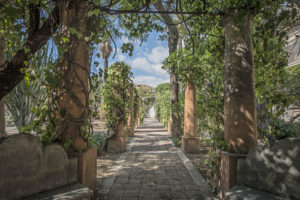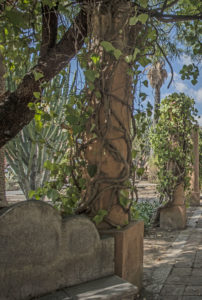The Giardino dei Novizi (Garden of Novices) is one of the most fascinating places in the monastery.
Over the centuries it has suffered a great deal of damage and experienced various transformations. In 1977 work began to restore the monastery, supervised by architect
Giancarlo De Carlo
.
The Garden of Novices, as the name suggests, was reserved for those beginning their spiritual journey to become part of the religious order, where they would observe and learn the Benedictine way of life.
The garden was built atop the accumulation of lava after the 1669 eruption; in the 20th century, it was destroyed to make room for a gymnasium that did not last long. The architect De Carlo recovered the old garden, restored the area, added a spiral staircase and fountain and turned it into a green space open to all.

